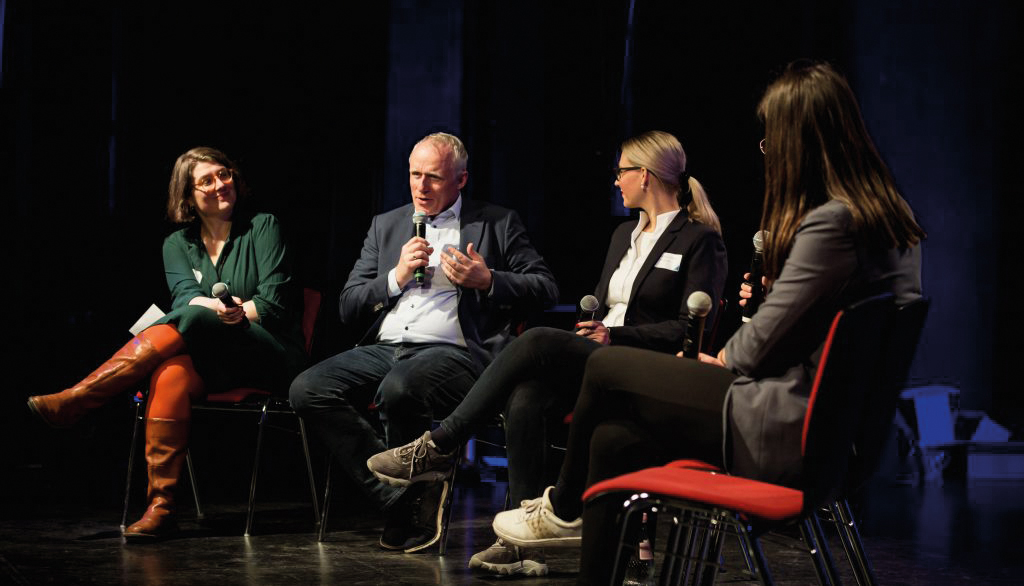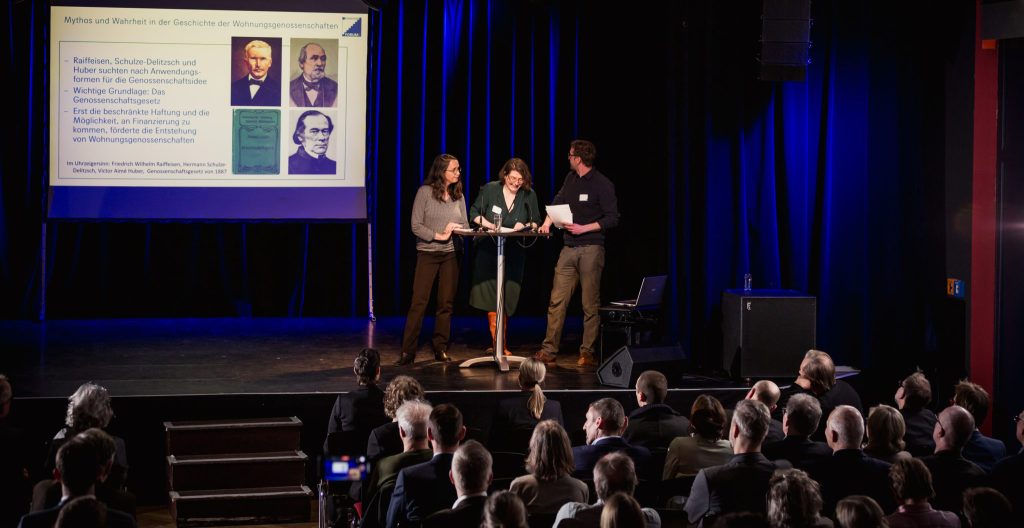The Berlin-based Genossenschaftsforum celebrated its 30-year anniversary in March. The forum is in association of 49 housing co-ops and other friendly organisations and individuals, which has four employees.
Since its inception in 1994, the Genossenschaftsforum has been tasked with facilitating exchange among members and increasing the visibility of housing co-ops in Berlin. Most recently in 2021, it opened a new space called werkraum (German for “workspace”) that shows exhibitions about the history of housing co-ops in Berlin and elsewhere, hosts events for students as well as discussion rounds for members, and organises tours of the nearby co-operative settlement complex Lindenhof, which is a beautiful example of 1920s modernist architecture and urban planning.
The theme of the anniversary gathering was “Long live homo co-operativus – a challenge to the continuing dominance of the concept of homo economicus as the nature of Man”. Homo economicus is a characterisation of humans in some economic theories as a rational person who pursues wealth for their own self-interest.
To speak to this heady topic, economist Dr Victoria Schäfer of Akademie der Genossenschaften was invited to give the keynote. She hails from an educational institution focused on training co-op professionals in the longstanding German co-operative banking sector. Her presentation outlined Adam Smith’s work on economic and social behaviour, which, she said, proves to be much more heterogeneous than is popularly known.

Claudia Burger / Genossenschaftsforum)
“The most cited and least read economist” is misrepresented, Dr Schäfer claimed, and should be considered in a more balanced fashion, as his views certainly make space for morally driven and co-operative behaviour. The key takeaway from her research in moral philosophy is that homo economicus is a socially constructed concept that has no empirical validity, but keeps influencing our behaviour because powerful actors continue to postulate this ideal of economic behaviour.
“If you claim that the sun revolves around the earth, that won’t suddenly come true,” explained Dr Schäfer – but social sciences have different powers of impacting its object of analysis: theories can unfold self-fulfilling powers when we enact the assumptions.
Related: Unlocking the ‘Missing Middle’: Lessons from Europe’s housing co-ops
Also speaking at the event were Dr Barbara König, Sebastian Mehling, and Caroline Rosenthal of the Genossenschaftsforum team, who offered a lively, interactive account of assumptions we hold around housing co-operatives, framed as myths: 1, the “self-help myth”, 2, the “closed shop myth”, and 3, the “co-ops make the world a better place myth”.
Using ample illustrations and images from their historical archives, the team staged a debate that answered all three myths with some version of an “it depends” verdict – there has always been a wide range of approaches in the co-operative housing field.
A third presentation was given by Johanna Kühner, who is a founding member of SuperCoop, a consumer co-operative supermarket open to members only and with a three-hour per-month work requirement. Members-only food co-ops with brick-and-mortar stores are rare at this point, where, especially in the US, an “everyone welcome” model of food co-op has become the norm. SuperCoop is modelled on Brooklyn’s Park Slope food co-op, which is one such unicorn closed-shop, member-labour co-op – and highly successful in terms of cost, growth, and stability.
The different presentations provided ample material for a broad discussion in the wrap-up of the event. One issue of current concern in the Berlin housing co-operative scene raised in the discussion was the lack of co-operation between established, longstanding housing co-operatives, many of which are rooted in German Democratic Republic heritage of prescribed collectivism, and those new and young co-operatives with a more progressive political agenda.

Karsten Ewert, a manager of Wuhletal Genossenschaft and a board director of the Genossenschaftsforum, proposed a closer collaboration between these groups, for example a collaboration on mutual investments. Building new housing has become much more expensive and unaffordable even for some co-operatives as real estate prices have skyrocketed in Berlin. The question raised was this: why does co-operation among co-operatives – which is an ICA principle of co-operativism – remain a challenge across sectors and even within sectors at times?
The guiding question for the discussion – how can we work towards a co-operative economy and bring on the age of homo co-operativus? – may not have been answered in the short time available for discussion. However, some important fields for action were identified in the areas of education and academic capabilities. Dr Schäfer reported that studies have shown how students of management and business administration actually show declining moral values over the course of their studies.
concept of homo economicus may have been falsified, but people can still be socialised into attitudes and behaviours that hinder a co-op mindset and a co-op economy. The panelists and the Genossenschaftsforum team agreed that we need to create more visibility for “Homo cooperativus”, particularly in Germany’s educational settings, academic institutions and programs – and especially in economics and management that currently quell and sideline the co-operative spirit rather than fostering it.

